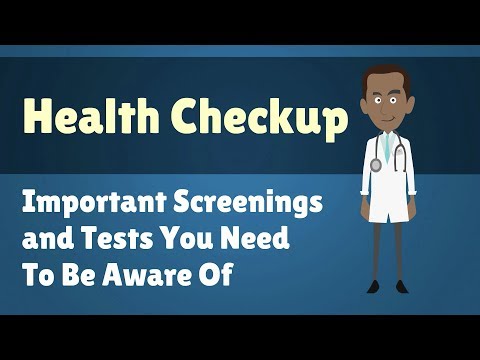Health Screening for the Elderly: What You Need to Know
Contents [show]
Health screenings are an important part of preventative care for seniors. But what types of screenings are recommended and how often should they be done?
Checkout this video:
Introduction
As people age, they become more susceptible to a variety of health conditions and diseases. To help identify these conditions early, doctors recommend that seniors undergo regular health screenings.
Health screenings can help detect potentially serious problems early, when they are more likely to be treatable. By getting the recommended screenings, seniors can stay healthier longer and enjoy a better quality of life.
There are a number of different health screenings that seniors should get on a regular basis. These include screenings for high blood pressure high cholesterol, diabetes, cancer, and more.
Some of these screenings are done through a simple blood test, while others may require a physical exam or other procedure. In some cases, you may need to see a specialist for a certain screening.
Your doctor will be able to let you know which screenings are recommended for you and how often you should have them done. It’s important to keep up with your screenings as recommended by your doctor in order to catch potentially serious problems early.
What is health screening?
Health screening is the process of looking for early signs of disease or illness in people who do not have any symptoms. It is usually done as part of a routine health check-up or during an annual physical exam. Screening tests can help find problems early, when they are easier to treat.
For the elderly, health screening is especially important because many health problems such as Heart Disease stroke, and cancer, tend to occur later in life. Screening tests can help find these problems early, when they are more likely to be treatable.
There are many different types of screening tests available, and the best screening test for you will depend on your age, your overall health, and your family history of disease.
Some common screening tests for the elderly include:
-Blood pressure measurement: High blood pressure is a major risk factor for heart disease and stroke. All adults should have their blood pressure checked at least once every two years. If you have high blood pressure, you may need to be checked more often.
-Cholesterol measurement: High cholesterol is a major risk factor for heart disease. All adults age 20 or older should have their cholesterol checked at least once every five years. If you have high cholesterol, you may need to be checked more often.
-Fasting blood sugar test: This test is used to diagnose diabetes mellitus (sugar diabetes). Diabetes increases your risk for heart disease and stroke. Adults age 45 or older should have this test at least once every three years. If you are overweight or have a family history of diabetes, you may need to be tested more often
What are the benefits of health screening for the elderly?
There are many potential benefits to health screening for the elderly. Screening can help detect diseases and conditions early, when they are often more treatable. It can also help identify risk factors for disease and allow elders to make lifestyle changes to reduce their risk. Additionally, screening can provide peace of mind and reassure elders that they are healthy.
What are the most common health screenings for the elderly?
As we age, it becomes even more important to take care of our health. Part of taking care of our health is getting regular health screenings. Health screenings can detect problems early, when they may be easier to treat.
There are many different types of health screenings, but some are more common for older adults. The U.S. Preventive Services Task Force (USPSTF) recommends that all adults age 50 and over get screened for colorectal cancer. The USPSTF also recommends that all women age 50 and over get screened for breast cancer every two years with a mammogram, and that all women age 65 and over get screened for bone loss with a bone density test. In addition, the USPSTF recommends that all men and women age 65 and over get vaccinated against pneumococcal disease, which can cause pneumonia, meningitis, and other serious illnesses.
Other common health screenings for older adults include blood pressure checks, cholesterol checks, diabetes screening, flu vaccinations, glaucoma screening, hearing tests, skin cancer screening, and vision tests. Talk to your doctor about which screenings are right for you.
How often should the elderly be screened for health?
Screening tests are an important part of preventative health care for people of all ages. They help to detect health problems early, when they are most treatable. But as we age, our risk for certain diseases and conditions increases, so it’s important to be aware of which screenings are recommended for seniors.
There is no one-size-fits-all answer to how often the elderly should be screened for health problems The frequency of screening tests will depend on many factors, including your age, overall health, family history, and personal preferences. However, there are some general guidelines that can help you make decisions about which screenings are right for you.
Here are some common health screenings that are recommended for seniors:
-Blood pressure: High blood pressure is a major risk factor for heart disease and stroke. It is recommended that all adults over the age of 18 have their blood pressure checked at least once every two years. If you have high blood pressure, you may need to be checked more often.
-Cholesterol: Everyone over the age of 20 should have their cholesterol checked at least once every five years. If you have a family history of heart disease or other risk factors for cardiovascular disease, you may need to be checked more often.
-Colorectal cancer: Regular screening for colorectal cancer is one of the most effective ways to prevent the disease. It is recommended that people over the age of 50 have a colonoscopy every 10 years or a stool test every year. If you have a family history of colorectal cancer or other risk factors, you may need to be screened more frequently.
-Diabetes: If you are over the age of 45 and overweight, it is recommended that you be screened for diabetes every three years. If you have a family history of diabetes or other risk factors, you may need to be screened more often.
-Prostate cancer: Prostate cancer screening is controversial and there is no consensus on how often it should be done. However, most experts agree that men over the age of 50 should discuss prostate cancer screening with their doctor and make an individualized decision about whether or not to have the test based on their risk factors and personal preferences.
Are there any risks associated with health screening for the elderly?
There are some risks associated with health screening for the elderly, but they are generally considered to be outweighed by the benefits. The most common risk is false positive results, which can lead to unnecessary anxiety and even invasive procedures such as biopsies. There is also a small risk of physical harm from the screenings themselves, such as from exposure to radiation during a CT scan. However, these risks are generally considered to be very low, and the potential benefits of early detection and treatment of serious health conditions make health screening for the elderly an important part of preventive care.
Conclusion
The decision to get health screenings is a personal one. But if you’re over age 50, it’s important to talk to your doctor about which screenings are right for you.Screenings can detect disease at an early stage, when treatment may be most effective. They also can help find diseases before they cause symptoms, when they’re easier to treat.
References
The following organizations can provide you with more information about health screenings for the elderly:
-The National Institute on Aging: https://www.nia.nih.gov/
-The Centers for Disease Control and Prevention: https://www.cdc.gov/
-The American Academy of Family Physicians: https://www.aafp.org/







